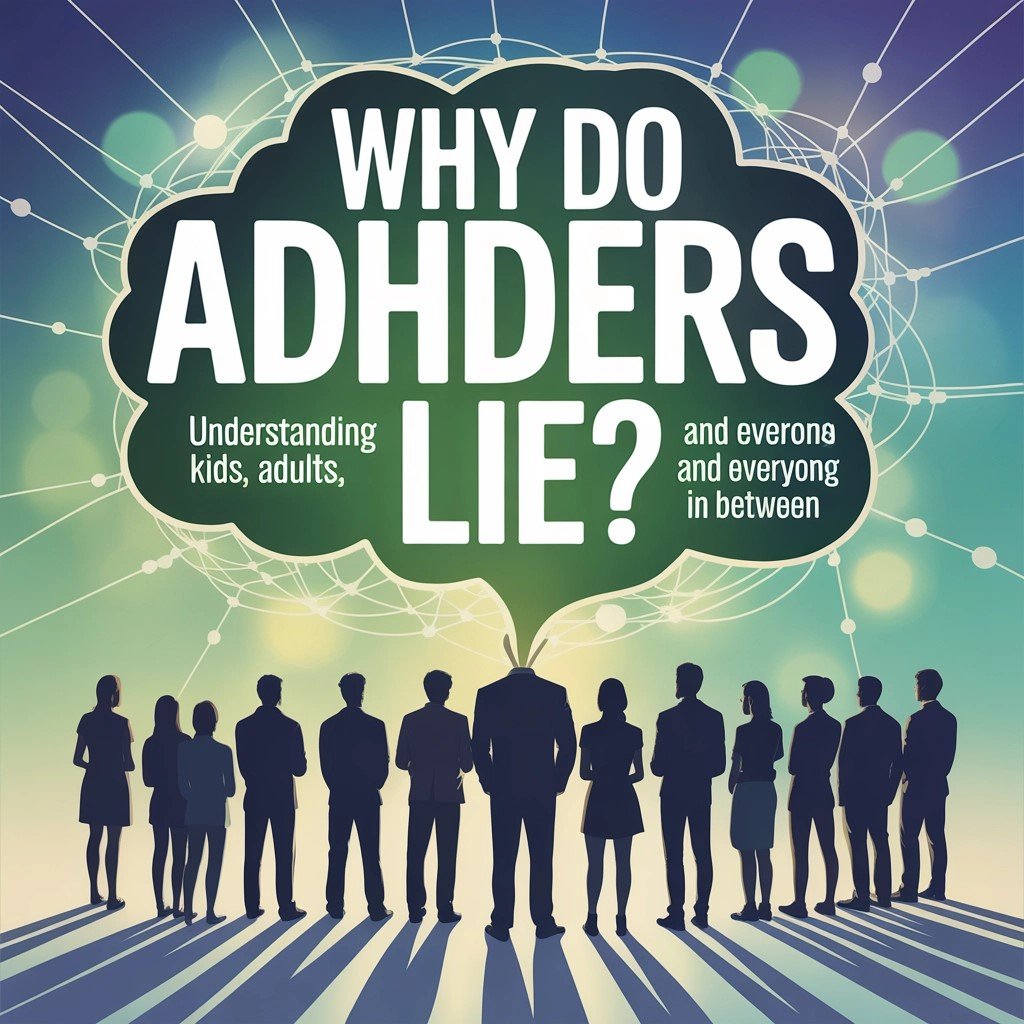Why Do ADHDers Lie? Understanding Kids, Adults, and Everyone In Between
Last week, a parent called me in tears while sitting in her car in the school pick-up lane. She said, “My 10-year-old with ADHD lies about everything. Homework. Chores. What happened at school. I don’t know what to do anymore.” I could hear the seatbelt chime in the background and a sibling asking for a snack. Real life, right?
If you are dealing with ADHD and lying, whether it is your kid, yourself, or someone you love, you are not alone. People ask me, “Why do ADHDers lie?” all the time at Heal and Thrive Therapy and Coaching. It is a top three question, no contest.
Here is the thing. ADHD and lying are not connected because people with ADHD are immoral. The truth is more layered, and honestly, more hopeful.
The Real Reasons Behind ADHD and Lying
When we talk about honesty and ADHD, we are really talking about how an ADHD brain runs its operating system. It is not about being bad or broken. It is about brains that process speed, emotion, time, and pressure differently. Let me walk you through it.

- Impulse Control and the Lightning-Fast ADHD Brain
ADHD brains move fast. Like, ideas-sprinting-ahead-of-words fast. Sometimes the mouth answers before the brain checks the calendar. I worked with a teen, Maya, who would launch into these wild stories about why she was late to class. The real reason was usually simple. She saw a cloud that looked exactly like a dragon and stopped to take a picture. And then the crosswalk light turned red. And then, well, the story kind of took off without her.
In the moment, the ADHD brain often picks the path of least resistance. If a quick story avoids embarrassment, panic, or a meltdown, it can feel like the easiest exit. Short-term relief. Long-term mess.
- Avoiding Shame and Criticism
This one breaks my heart a little. Many ADHDers, especially kids and teens, hear a loop of criticism. “Why did you forget?” “Again?” “What is wrong with you?” Even the well-meaning stuff can sting. Over time, people start bracing for the next hit.
So lying becomes a shield. Not manipulation. Protection. When you have been told you are careless or disappointing a hundred times, bending the story to avoid more shame can feel safer than risking that face-drop look from someone you love. I know that look. You probably do too.
- Memory and Executive Function Challenges
Sometimes what looks like lying is actually memory blur. ADHD affects working memory and executive function. Which means the brain might log intention as reality. It is a thing. You decide to send the email, you open the tab, you even type the subject line. Your brain checks it off. Done. Except it is not.
I worked with James, a 35-year-old with ADHD, who swore he had submitted a report on time. He was not trying to deceive anyone. He truly believed it was done. We retraced his steps and found the tab still open. He had thought about submitting, planned to submit, opened the portal, then got pulled into a Slack ping. His brain filed all of that under finished. The final click never happened.
Understanding ADHD and Lying by Age
Kids with ADHD and Lying Behavior
Little kids with ADHD often tell what I call magical thinking lies. They are not plotting. They are making a story that helps the moment feel better. And it can feel true to them right then.

Common lying patterns in ADHD kids:
- Impulsive answers when they feel cornered
- Fantasy stories to soften disappointment
- Time confusion, saying they did a thing they planned to do
- Attention-seeking stories to feel special or included
Eight-year-old Sam told his teacher, “I finished my math,” even though the worksheet was still in his backpack with the pencil marks from where the dog nudged his arm. When we talked about it, he said, “I wanted to finish it so bad that it felt like I did.” That is intention turning into memory. Classic ADHD brain move.
Teens: The Complexity Multiplies
Teenagers are under pressure from every direction. They want independence, they still wrestle with ADHD symptoms, and they are hyper-aware of social judgment. That combo creates more complicated lying patterns.
Teen ADHD lying often involves:
- Covering up missed responsibilities or deadlines
- Hiding struggles to look normal with friends
- Dodging consequences they feel are unfair or too big
- Masking ADHD symptoms to blend in socially
Sixteen-year-old Alex kept saying the college applications were done. The truth was not lazy or stubborn. She was frozen by the complexity. Logins. Essays. Recommendation requests. She felt ashamed to ask for help. Saying “It is done” bought her time to breathe and figure it out. Or so she hoped.
Adults: When ADHD Lying Becomes a Coping Mechanism
By adulthood, many folks have built tiny workaround stories that help them keep jobs, relationships, and reputations intact. Not because they are bad people. Because the systems around them were not built with their brain in mind.
Common adult patterns include:
- White lies about time, “On my way,” while still searching for keys
- Covering up forgotten commitments or missed tasks
- Hiding ADHD symptoms from managers or partners
- Avoiding confrontation about repeated mistakes
Lisa, a marketing executive, came to me exhausted. She would tell coworkers, “Just putting the final touches on it,” while the doc was still a blinking cursor and an outline. Then she would scramble late into the night to make the words true. The relief was temporary. The stress was relentless.
What Actually Helps: Practical Strategies That Work
Good news. Lying patterns can change. This is absolutely workable. The trick is to focus on the need under the lie. Treat the root, not just the symptom.
Build Safety First

Truth needs safety. If telling the truth leads to shame or disaster, people will avoid it. Start here.
- Respond to honesty with problem-solving, not punishment
- Name the courage it takes to tell a hard truth
- Separate ADHD symptoms from moral character
Use These Parent Scripts
You do not need perfect words. You just need safer ones.
Instead of: “Why did you lie to me?”
Try: “This seems overwhelming. Help me understand what happened.”
Instead of: “You are always lying about homework!”
Try: “Homework is rough right now. Let us build a system that actually works.”
Instead of: “I cannot trust you anymore.”
Try: “I love you. I want you to feel safe telling me the truth, even when it is messy.”
For Adults: Self-Compassion Strategies
If you are an adult dealing with impulse-y answers and pressure, try this.
- Pause before responding. Even two seconds can change the outcome
- Use the phrase, “Let me think about that.” Buy yourself a beat to answer honestly
- Name the real issue. Are you overwhelmed, behind, afraid of judgment, or trying to avoid conflict?
Create Systems That Support Honesty
- Use visual reminders and shared calendars to shrink memory mix-ups
- Build buffer time into tasks so a late start does not spiral
- Practice truth-telling in low-stakes moments to grow the muscle
- Consider ADHD coaching to strengthen executive function and planning skills
The Neurobiological Reality

Research shows that many kids with ADHD have lower activation in brain regions for cognitive control and decision-making. This is not an excuse. It is an explanation that helps us respond wisely.
When we understand that impulse control and time awareness are wired differently, we can meet behavior with curiosity, not judgment. We build supports that fit the brain, not just pep talks about willpower.
Breaking the Cycle: Long-term Solutions
The most effective approach to ADHD and lying combines a few key pieces.
- Treat core ADHD symptoms with the right mix of supports and care
- Build executive function skills like planning, prioritizing, and memory strategies
- Shape the environment so situations do not require fibs to survive
- Develop emotional regulation tools for stress, shame, and overwhelm
Remember Maya, the cloud-watching teen? Six months later, she had multiple alarms, transition warnings, and a habit of texting, “Running five minutes late, distracted again,” instead of spinning a story. Actually, let me rephrase. She built enough confidence to be honest and okay with it.
When Professional Help Makes Sense
If lying patterns are hurting school, work, or relationships, it might be time for extra support. ADHD therapy and coaching can offer tailored strategies and address anxiety or self-esteem issues that fuel the habit.
Sometimes a lying streak is a blinking sign that current ADHD supports need a tune-up. That could mean a medication check, new behavioral strategies, or addressing co-occurring anxiety or depression.

Moving Forward with Understanding
ADHD and lying do not have to travel as a pair forever. With understanding, strategies, and steady support, people can build honest communication that fits how their brain works. It takes time. It is worth it.
Under most lies, you will find a nervous system trying to avoid judgment, handle big feelings, or navigate a world that is not designed for ADHD. That context changes how we show up.
If you are in the middle of this with yourself or someone you love, start with compassion. Ask what need the lie is trying to meet. Then work together to meet the need in a healthier way.
Ready to Build Better Communication?
Understanding why ADHDers lie is step one. If you are ready to move from “I get it” to “We have a plan,” our team at Heal and Thrive is here. We help families and adults build practical strategies that honor ADHD brains and create more honest, less stressful relationships.
Contact us today to learn about ADHD coaching and therapy options. Everyone deserves to feel safe telling their truth.
Meta Descriptions:
- Why do ADHDers lie? Learn the real reasons and get practical, compassionate strategies to build honesty with kids, teens, and adults. (156 chars)
- ADHD and lying is not about bad character. Discover the brain-based reasons and the scripts, supports, and tools that actually help. (152 chars)
- Explore impulse control, masking, and shame in ADHD. Get down-to-earth tips for parents and adults, plus when to seek extra support. (156 chars)

